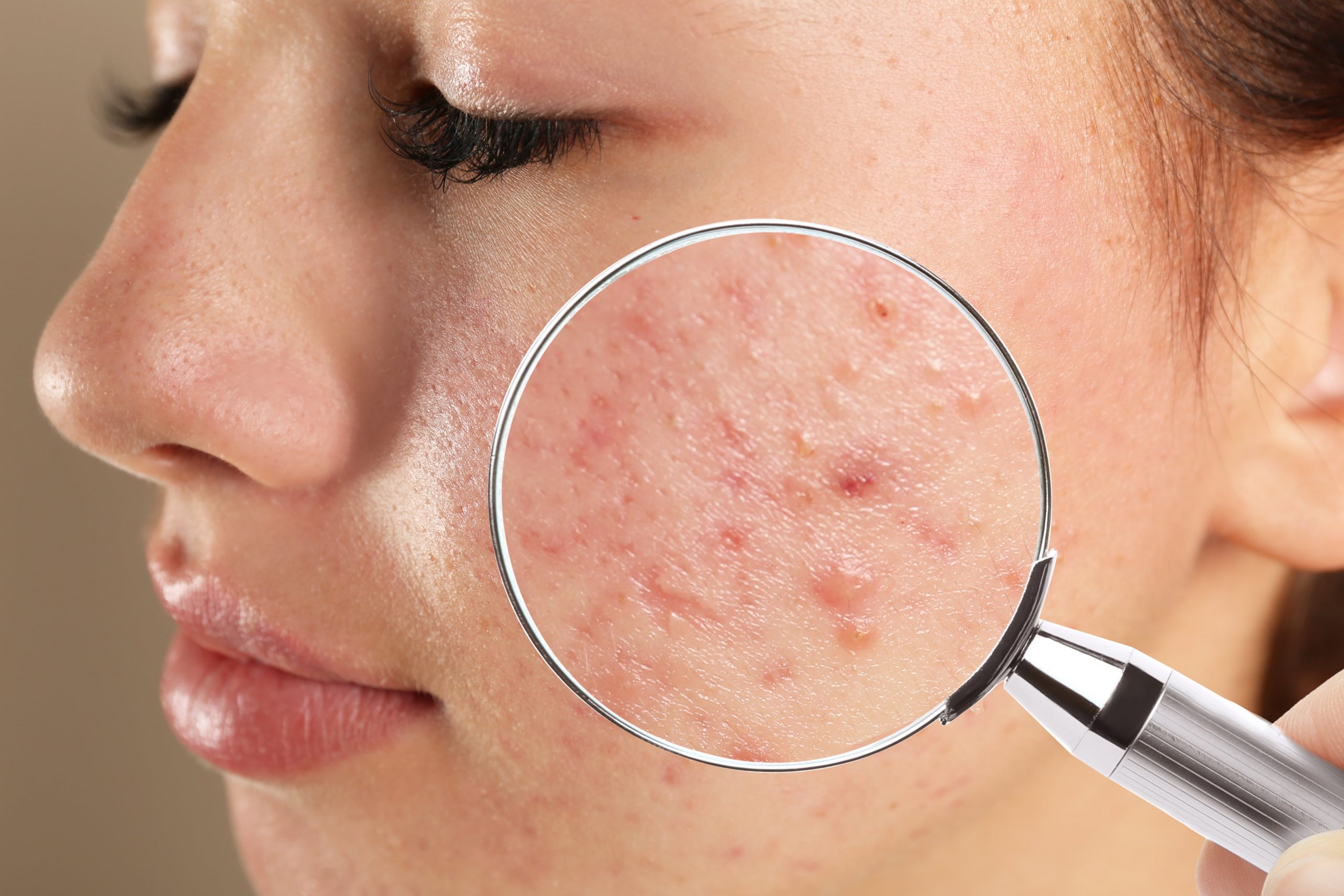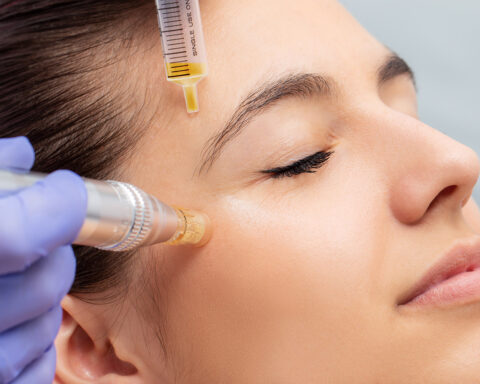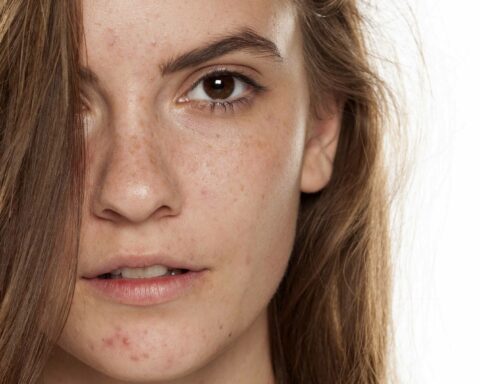Can CBD help treat acne? CBD oil has seeped into virtually every beauty product on the market. CBD has pushed its way into people’s self-care products and has been dubbed a “Wonder Ingredient” because of its anti-anxiety, antioxidant, and anti-inflammatory properties. And even more, the latest studies suggest CBD oil could be the missing puzzle in getting rid of your acne and skin irritations. For years, people have utilized natural products to promote skin health, but Cannabidiol oil (CBD) is growing in popularity as a potential pain reliever, skin softener, and acne remedy. That said, let’s examine how CBD oil can be used as an effective aid in treating acne, including the science behind it.
Acne is a skin condition that occurs when skin oil and dead skin cells clog the hair follicles, leading to skin issues such as scarring, whiteheads, pimples, oily skin, and blackheads. This skin condition often affects areas of the body with numerous oil glands such as the upper chest, face, and back. People with the symptoms above of acne, especially the scarring on the skin, can experience low self-esteem, anxiety, depression, and even suicidal thoughts.
Causes and Symptoms of Acne
For 80% of cases, experts link acne to genetics. However, other contributing factors include cigarette smoking, hygiene, and diet. Whichever the case, this condition is driven by a hormone called androgen, which increases sebum production in the skin cells. Other factors include the excessive growth of bacteria in the skin cells.
Whereas the main trigger of the development of acne has been identified as genetics, the role other risk factors such as stress, diet, infections, and hormones play have not been conclusively established. That said, let’s discuss what research has identified about these risk factors:
Genes – Genetic studies indicate that 80% of acne cases appear to be hereditary. A focused study on twins with acne showed a strong correlation between genes and the development of this skin condition.
Infections – The growth of anaerobic bacteria in the skin can contribute to the formation of acne. While the skin has useful bacteria, particular strains are associated with severe inflammatory acne.
Hormones – Hormonal activity like that triggered during adolescence, and menstrual cycles can lead to the formation of acne. That’s because, during adolescence, sex hormones called androgen are produced aplenty, increasing the growth of follicle glands in the skin, which subsequently produces more oily sebum. Such hormones include testosterone, dihydrotestosterone (DHT), etc., and have all been linked to the development of acne.
Diet – Diets with higher concentrations of glycemia have been found to increase the severity of acne. And separate controlled studies have indicated that diets with low glycemic loads can reduce acne.
What are the Conventional Treatments of Acne?
There are multiple treatments and therapies for acne out there on the market. Whether it is lifestyle changes, prescription medications, or medical procedures, people use multiple therapies to treat acne, depending on the severity of the condition. But experts say that simple lifestyle changes such as reducing intake of simple carbs can ease the symptoms of acne.
Some treatment options include topical application on the skin around the affected area using benzoyl peroxide and salicylic acid. In contrast, others involve the intake of antibiotics to fight the growth of harmful strains of bacteria in the skin.
Statistically, over 650 million people globally had acne in 2018, making this condition the eighth most widespread infection worldwide. And whereas acne can affect anyone, it was reported to be prevalent in teens around the adolescence stage, who accounted for 80% of those with acne around that time. However, the disease tends to be less common as folks approach their 40s and beyond.
Key Symptoms of Acne
Scars – Acne scars result from inflammation of the dermis and the abnormal healing that follows. This condition affects over 90% of people with acne vulgaris.
Pigmentation – Often, pigmentation occurs after an inflamed nodular resolve. What happens after that is that the skin tends to darken around that area. This condition is called post-inflammatory hyperpigmentation (PIH) and is prevalent in folks with darker skin complexions.
Does CBD Work for Acne?
As discussed earlier, acne occurs when excess oily sebum, dirt, or dead skin cells clog the pores present in the dermis. As a result, bacteria growth starts building up in the pores, leading to redness and inflammation in the affected area. That said, the key to preventing this condition is to identify the risk factors and avoid them. That is, keep your skin clean and free from acne-causing bacteria and cut back on excessive oil that could clog the follicle pores.
Today, much of what is done in research surrounding acne and CBD is focused on how CBD can stop the factors that lead to the development of this condition, more so the build-up of excess oil in the skin. Regarding that, researchers conducted experiments on the effects of CBD on oil-producing glands using samples of skin. It was found that CBD inhibited oil production in the skin and had anti-inflammatory effects on the sebaceous glands. It was therefore concluded that CBD had promising therapeutic properties that could benefit folks with acne.
How CBD Works for Acne Scars
Acne scars occur because of underlying skin disruptions that cause pimples, blackheads, and whiteheads. A 2020 study published in the Journal of Clinical Therapeutics involved participants who had scars caused by acne, atopic dermatitis, and psoriasis. The participants were told to apply CBD-enriched ointments on the scars twice per day for three months. The study found that CBD significantly improved participants’ skin appearances regarding skin elasticity and hydration. And while this was simply a small study, the use of CBD oil for the treatment of acne showed promising results.
Benefits of CBD Oil for the Treatment of Acne
- CBD oil I packed with antioxidants that keeps the skin free of radicals that result from environmental damage.
- CBD cuts down on the production of oil from sebaceous glands, hence inhibiting the formation of acne.
CBD oil possesses anti-inflammation properties that soothe the skin of irritation caused by acne. This helps minimize skin itchiness and redness, making the condition to be less painful.
- How the Pec Deck Works Your Chest - April 19, 2024
- Homemade Eye Drops: Risks, Benefits, and More - April 19, 2024
- SMART TOOTHPICKS COMPANY - July 29, 2023









